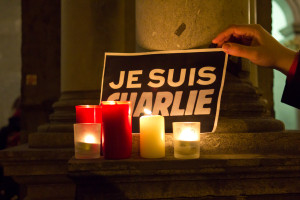
In the days since the Paris shootings, people on both sides of the Atlantic have closed ranks around Charlie Hebdo. Notorious for its publication of anti-Muslim caricatures, the newspaper is now being hailed as a brave defender of free speech. But for those who believe not only in free expression but free people, this should be a profoundly disturbing development.
Contrary to the dominant media narrative, freedom of speech is not the primary issue here. Like the “free market,†it is a social construct that obscures more than it illuminates. And just as free markets are not actually free from government intervention when corporate interests are on the line, neither is speech, which is rigorously policed when dissent threatens to spiral out of control.
In his 1965 essay “Repressive Tolerance,†Herbert Marcuse noted that this so-called freedom of speech was deceptive, privileging ideas favored by the elite and thus deepening the subjugation of oppressed groups. Consequently, the most relevant question in any “free speech†dispute is the extent to which the speech served or challenged power.
It should go without saying that no one should be harmed over a drawing. It should likewise go without saying that not all drawings are morally equal. Art can be used to reinforce prevailing power structures, or to dismantle them. Value judgments must be made.
By publishing racist caricatures meant to humiliate Muslims, who constitute a poor, marginalized minority in France and whose homelands are on the receiving end of Western imperial violence, Charlie Hebdo lined up, in this case, squarely on the side of the power structure.
Such power differentials often go unnoticed in the United States, where people are conditioned to think of their country as a pluralistic, democratic society where everyone is equal under the law. As a result, satire about religion or race seem harmless enough. People offend each other from time to time, but they are operating on a level playing field. It is seen as basically fair.
But this idealized, colorblind vision of society erases the reality of oppression based on race, class, and gender. It ignores an ongoing history of genocide and colonialism. In reality, when members of the dominant group mock those being crushed underfoot, all in the name of “free speech,†it takes on a very different tone from the elite making fun of itself.
That’s why the constant media refrain that Charlie Hebdo was an equal-opportunity offender, insulting Christians and Muslims alike, is ultimately meaningless. In one case, you are poking fun at your political and socio-economic equals; in the other, you are relishing in the powerlessness of those further down the ladder.
If journalism is supposed to comfort the afflicted and afflict the comfortable, as Finley Peter Dunne put it, Charlie Hebdo’s publication of Islamophobic cartoons did just the opposite. What it did was dangerous, but it was not brave. And it certainly should not be celebrated.